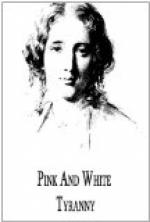“This obligation once admitted, must it not be a necessity to know how to lie well? In France, the women lie admirably. Our customs instruct them so well in imposture. And woman is so naively impertinent, so pretty, so graceful, so true, in her lying! They so well understand its usefulness in social life for avoiding those violent shocks which would destroy happiness,—it is like the cotton in which they pack their jewelry.
“Lying is to them the very foundation of language, and truth is only the exception; they speak it, as they are virtuous, from caprice or for a purpose. According to their character, some women laugh when they lie, and some cry; some become grave, and others get angry. Having begun life by pretending perfect insensibility to that homage which flatters them most, they often finish by lying even to themselves. Who has not admired their apparent superiority and calm, at the moment when they were trembling for the mysterious treasures of their love? Who has not studied their ease and facility, their presence of mind in the midst of the most critical embarrassments of social life? There is nothing awkward about it; their deception flows as softly as the snow falls from heaven.
“Yet there are men that have the presumption to expect to get the better of the Parisian woman!—of the woman who possesses thirty-seven thousand ways of saying ‘No,’ and incommensurable variations in saying ‘Yes.’”
This is a Frenchman’s view of life in a country where women are trained more systematically for the mere purposes of attraction than in any other country, and where the pursuit of admiration and the excitement of winning lovers are represented by its authors as constituting the main staple of woman’s existence. France, unfortunately, is becoming the great society-teacher of the world. What with French theatres, French operas, French novels, and the universal rush of American women for travel, France is becoming so powerful on American fashionable society, that the things said of the Parisian woman begin in some cases to apply to some women in America.
Lillie was as precisely the woman here described as if she had been born and bred in Paris. She had all the thirty-seven thousand ways of saying “No,” and the incommensurable variations in saying “Yes,” as completely as the best French teaching could have given it. She possessed, and had used, all that graceful facility, in the story of herself that she had told John in the days of courtship. Her power over him was based on a dangerous foundation of unreality. Hence, during the first few weeks of her wedded life, came a critical scene, in which she was brought in collision with one of those “pitiless questions” our author speaks of.
Her wedding-presents, manifold and brilliant, had remained at home, in the charge of her mother, during the wedding-journey. One bright day, a few weeks after her arrival in Springdale, the boxes containing the treasures were landed there; and John, with all enthusiasm, busied himself with the work of unpacking these boxes, and drawing forth the treasures.




